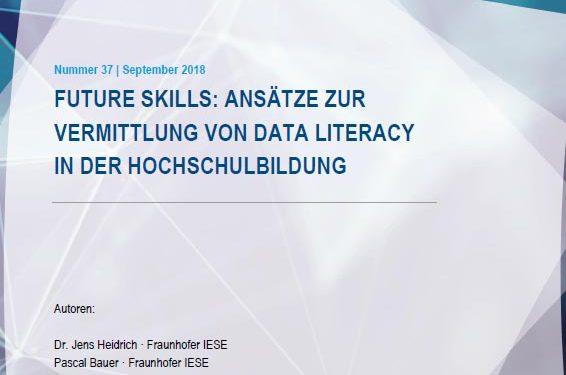In the context of digital transformations, the ability to deal with data in a planned manner and to consciously use and question this data in the respective context is becoming increasingly important and represents a central competence in all sectors and disciplines. On the one hand, data scientists, there is demand for data scientists who are capable of handling large amounts of heterogeneous data, in particular, and who have mastered the technology surrounding the Big Data lifecycle in order to make quick decisions based on data and information derived from such data. On the other hand, all sectors and disciplines have a need for people who are capable of collecting, managing, evaluating, and using data in a critical way. These skills are summarized under the term Data Literacy.
On behalf of the working group Curriculum 4.0 of the Hochschulforum Digitalisierung (German Forum for Higher Education in the Digital Age, HFD), Fraunhofer IESE and the German Informatics Society (Gesellschaft für Informatik, GI) have performed a study to compile implementable knowledge for universities and subjects for curriculum development with regard to data literacy. The focus was on European and international Best Practices examples that have developed programs for the needs-oriented, interdisciplinary teaching of knowledge about data-supported work and decision-making.
In the context of this research, 89 potential Best Practice examples were studied and classified. 15 case studies of particular interest were selected and analyzed in detail. Semi-structured interviews were conducted in six case studies and an online survey was designed with 69 participants. In the context of an international workshop in Berlin, recommendations for action were then developed with 19 selected experts. In this article, we want to discuss selected results regarding the key questions of the study.
Key question 1: What is meant by Data Literacy and what are the relevant focal points?
“Data Literacy” is defined as the ability to collect, manage, evaluate, and use data in a critical manner. Both in the expert interviews and in the survey, a majority of the people agreed with this definition either completely or partly. However, there is great overlap with the term “Information Literacy” as well as with related terms such as “Data Information Literacy”, “Science Data Literacy”, “Digital Literacy”, or “Statistical Literacy”.
Across the literature it can be seen that data literacy competencies should be taught as early as possible. Awareness for their importance must be conveyed to both students and organizations. Any offer must also be adapted to different educational levels and, for every discipline, to its specific context, terminology, and issue-specific workflow. The interviews revealed that different integration models are conceivable, from stronger inclusion of online offers via the provision of a central entry course with expansion modules to fully integrated solutions. The structure of the programs is often modular and state-of-the-art teaching methods (such as hands-on learning and project-based learning) are used. In all case examples, there existed collaborations with other departments or institutions. The motivation for educators to participate in joint programs was mainly personal interest and expansion of their own skills.
Key question 3: What is an interdisciplinary set of basic competencies and what are special competencies?
According to Ridsdale et al. (“Strategies and Best Practices for Data Literacy Education: Knowledge Synthesis Report”, report, 2015), the following basic/conceptual competencies, core competencies, and advanced competencies are distinguished.
| Competencies | Conceptual | Core | Advanced |
| (1) Conceptual Framework | |||
| Introduction to Data | X | ||
| (2) Data Collection | |||
| Data Exploitation and Collection | X | ||
| Evaluation and Quality Assurance of Data Sources | X | ||
| (3) Data Management | |||
| Data Organization | X | ||
| Data Manipulation | X | ||
| Data Conversion | X | ||
| Metadata Generation and Use | X | ||
| Data Healing, Security, and Reuse | X | ||
| Data Storage | X | ||
| (4) Data Evaluation | |||
| Data Tools | X | ||
| Basic Data Analysis | X | ||
| Data Interpretation | X | ||
| Use of Data to Identify Problems | X | ||
| Data Visualization | X | ||
| Data Presentation | X | ||
| Data-driven Decision-Making | X | ||
| (5) Data Application | |||
| Critical Thinking | X | ||
| Data Culture | X | ||
| Data Ethics | X | ||
| Data Citation | X | ||
| Data Sharing | X | ||
| Evaluation of Decisions based on Data | X |
What is regarded as basic and what as advanced competence is also related to which educational purpose of data literacy is emphasized most: the teaching of basic competencies to responsible educated citizens or the teaching of competencies that are important for specific disciplines and application purposes.
Key question 4: What are the requirements of society, the labor market, and the scientific community on graduates?
Following the survey and the interviews, it can be seen that, in summary, skills regarding the ethically correct handling of data are particularly important for society; that the labor market focuses on individual, more technical skills; and that a broad competence profile is more in demand in the scientific community.
Key question 5: What are action recommendations for curricular implementation?
Based on the literature sources and the interviews we performed, a series of challenges and measures could be identified, which were then condensed in the context of our expert workshop into recommendations for actions in three areas:
| Structures and Collaboration | Competencies and Integration | Competence Transfer |
|
|
|
The complete study can be downloaded [in German only] from the website of the Hochschulforum Digitalisierung (German Forum for Higher Education in the Digital Age, HFD) starting immediately. A short presentation with the results for the key questions [in English] is also available.

